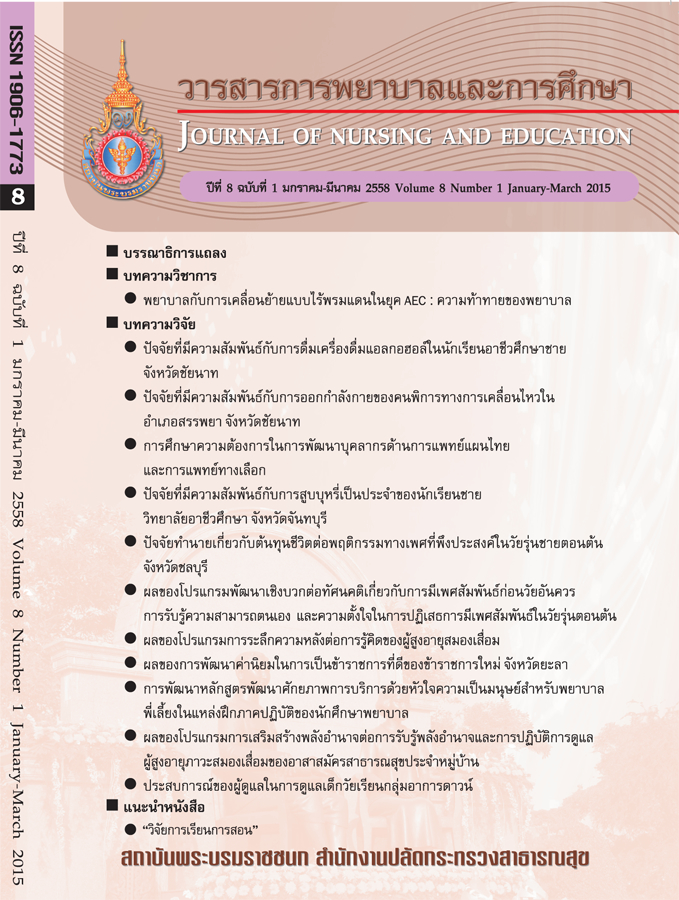ประสบการณ์ของผู้ดูแลในการดูแลเด็กวัยเรียนกลุ่มอาการดาวน์*
คำสำคัญ:
Caregiver, Caring, Children With Donw Syndromeบทคัดย่อ
บทคัดย่อการวิจัยเชิงคุณภาพ ตามแนวคิดแนวปรากฏการณ์วิทยาของ Husserl นี้ มีวัตถุประสงค์เพื่อศึกษาประสบการณ์ของผู้ดูแลในการดูแลเด็กวัยเรียนกลุ่มอาการดาวน์ ผู้ให้ข้อมูล คือผู้ดูแลเด็กกลุ่มอาการดาวน์ อายุ 6-12 ปี ที่มีประสบการณ์ในการดูแลเด็กอย่างน้อย 6 เดือน และสามารถดูแลเด็กให้มีความสามารถ
อยู่ในบริบทของโรงเรียน Abstract ได้คงที่หรือมีการพัฒนาในทิศทางที่ดีขึ้น มีจำนวนทั้งสิ้น 10 ราย
เก็บรวบรวมข้อมูลโดยวิธีการสัมภาษณ์แบบเจาะลึกร่วมกับการบันทึกเทป นำข้อมูลที่ได้มาถอดความแบบคำต่อคำ วิเคราะห์ข้อมูลตามวิธีของ Colaizzi ผลการวิจัยพบว่า ประสบการณ์ของผู้ดูแลในการดูแลเด็ก
วัยเรียนกลุ่มอาการดาวน์ ประกอบด้วย 6 ประเด็นหลัก คือ 1) กระตุ้นเพื่อพัฒนาการ 2) สอนเพื่อการเรียนรู้
3) เลือกโรงเรียนให้เหมาะสม 4) ฝึกให้เข้าสังคม 5) กำลังใจเป็นสิ่งสำคัญ และ 6) ชุมชนยอมรับ
ผลการวิจัยครั้งนี้ สามารถนำไปเป็นแนวทางการช่วยเหลือผู้ดูแลเด็กวัยเรียนกลุ่มอาการดาวน์
ได้สอดคล้องกับปัญหาและตรงตามความต้องการของผู้ดูแลแบบองค์รวม
คำสำคัญ : ผู้ดูแล การดูแล การดูแลเด็กกลุ่มอาการดาวน์
Abstract
This qualitative research study used Husserl phenomenological approach. The purpose was to describe experiences of caregivers in caring for children with Down syndrome (DS). The informants were 10 caregivers of children with DS aged 6-12 years and had caring experience for more than
6 months. They were able to maintain or improve the DS children’s ability to stay in the school context. Data were collected by using the in depth interview with tape-recorder. The interviews were transcribed verbatim. Data were analyzed by using Colaizzi’s method.
Findings revealed that experiences of caregivers in caring for DS children can be categorized into 6 major themes which included 1) stimulated development, 2) teaching to learning, 3) choosing the right school, 4) social practice 5) encouragement and 6) community acceptance.
The results provide information for nurses to be aware of and aid in planning for helping caregivers according to their problems and holistic needs in caring for DS children.
Keywords: Caregiver; Caring; Children With Donw Syndrome






